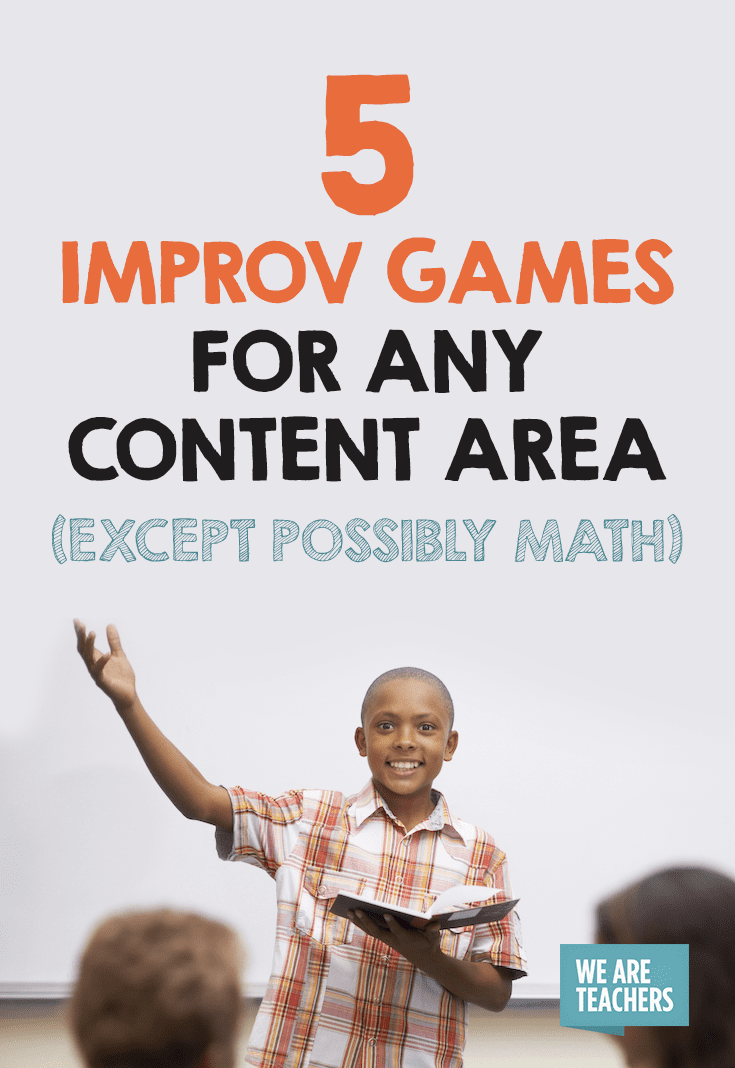I was a big improv comedy dork in college. (My memoir will be titled I Never Said I Was Cool.) I tried out for a comedy troupe my freshman year, somehow made it, and that was my social milieu for the next four years. I wasn’t even that good, although I did manage to marry the funniest guy in the group a few years later. Regardless, my college improv experiences did not pave the way to fame. They did, however, make me a better teacher. I use improv games all the time in the classroom, mostly because I don’t like to actually write detailed lesson plans. Occasionally, I even let the kids do improv, and I’ve found through trial and error a few games that work pretty well to cover content or review.
1. Build Me a Bridge
I use this as a warmup on days when I need my kids to do focused work in groups, especially if they’ll be sitting a lot that day. They choose groups of three to six kids—and it’s important to let them choose their own groups here, because they won’t work with kids they don’t trust—and then I yell out an object and set a timer for one minute. They have those sixty seconds to use their bodies to create that object; a taco, a sailboat, or, you know, a bridge. Or whatever you come up with that seems funny. After a minute, they freeze and you pick a winner. If you want to make this more content focused, you can give them academic topics, like plant cells or To Kill a Mockingbird or whatever.
Disclaimer: My kids LOVE this game, and they would play it every day. It’s a great chance for your introverts to emerge as leaders, since a lot of kids have these crazy spatial reasoning skills that, as a language arts teacher, I rarely get to see. But I’ve never played it during an observation because it involves a lot of touching between students and also because I’m afraid the one time my principal watches will be the time a kid gets a concussion. Because this game gets rowdy.
2. Campfire Story Vocabulary Review
For this game, the kids all sit in a big circle with a list of the vocabulary words you’re reviewing. You choose a kid to start off a story, that kid says one sentence, then the kid next to him or her says a sentence, and so on around the story. Each sentence has to correctly use a vocabulary word. If your kids are having trouble with this, try making them use starters like “fortunately,” “unfortunately,” or “meanwhile.” It’ll add a little structure to the activity and help the more hesitant kids along. If the story ends before you run out of students/vocabulary words, they can always start a new one!
3. Questions
Traditionally, this game is between two performers, each of whom can only speak in questions. I’ve used it with great success in sixth grade to teach declarative, imperative, interrogative, and exclamatory sentences. I give each kid a piece of paper with his or her type of sentence, they get a scenario—“You’re at a party”—and they have a dialogue in which they can only use their type of sentence. I’ve done it with less success in seventh grade with simple, compound, and complex sentences. I don’t know how you’d use it in science or social studies, but I’m sure there’s a way!
Disclaimer: You want volunteers for this game; if you cold-call on kids, they’ll get up and just stand there and it will kill your class momentum. Just remember, there’s no shame in bribing kids to volunteer for something. Also, it works best if you’re a performer in the first couple of rounds to help the kids along.
4. Party Quirks
This is a guessing game. One player is designated the host and leaves the room while you assign characters to the other three players. These three players can be historical figures, literary characters, scientists…whatever your kids need to review. Once each character has been assigned, the “host” comes back in and begins preparing the party. One at a time, your “guests” enter and try to drop subtle hints about their character. (“Well, this party is evolving nicely,” says Charles Darwin. Boo Radley hangs out creepily in the corner.) The host’s job is to guess who each character is.
Disclaimer: This is another one where you want willing participants, and I’d play in a round or two first if I were you. It’s probably going to flop spectacularly a few times before it gets off the ground, so don’t think you’re doing something wrong if that happens. This is a tough skill.
5. Free Form Conversation
Put a bunch of names in a hat. Or you could use cell parts or planets or something science-y like that. Two kids get onstage and the rest of the class gives them a location. Then they each pick a name and play that character in a scene that takes place in that location, i.e. Macbeth and Tom Joad hanging out in a karaoke bar. You stop the scene when it starts either dying or getting inappropriate.
Disclaimer: This works best with higher level kids. Also, some kids will never be willing to play this game. And that’s okay. I wouldn’t make it mandatory, since this is some kids’ worst nightmare.
There are other games I use in the classroom, but these are the easiest to start with. While they don’t work for every class or every kid, once the kids get the hang of it, they’re a great way to review.
Do you use improv in the classroom? I’d love to add some new games to my repertoire, so please share in the comments!


